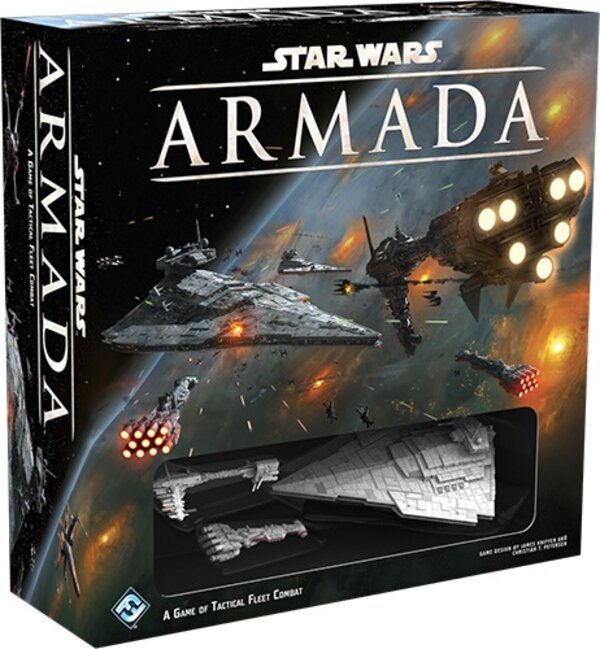 “General, there’s a fleet of Star Destroyers coming out of hyperspace in sector four.”
“General, there’s a fleet of Star Destroyers coming out of hyperspace in sector four.”
–The Empire Strikes Back
Fantasy Flight Games is proud to announce the upcoming release of
Star Wars™: Armada, a two-player miniatures game of epic fleet battles in the
Star Wars galaxy!
Massive Star Destroyers fly to battle against Rebel corvettes and frigates. Banks of turbolasers unleash torrential volleys of fire against squadrons of X-wings and TIEs. Engineering teams race to route additional power to failing shields. Laser blasts and explosions flare across the battlefield. Even a single ship can change the tide of battle.
In
Star Wars: Armada, you assume the role of fleet admiral, serving with either the Imperial Navy or Rebel Alliance. You assemble your fleet and engage the enemy. Using the game’s unique maneuver tool, you steer your capital ships across the battlefield, even while squadrons of starfighters buzz around them. Then, as these ships exchange fire, it’s your job to issue the tactical commands that will decide the course of battle and, perhaps, the fate of the galaxy.
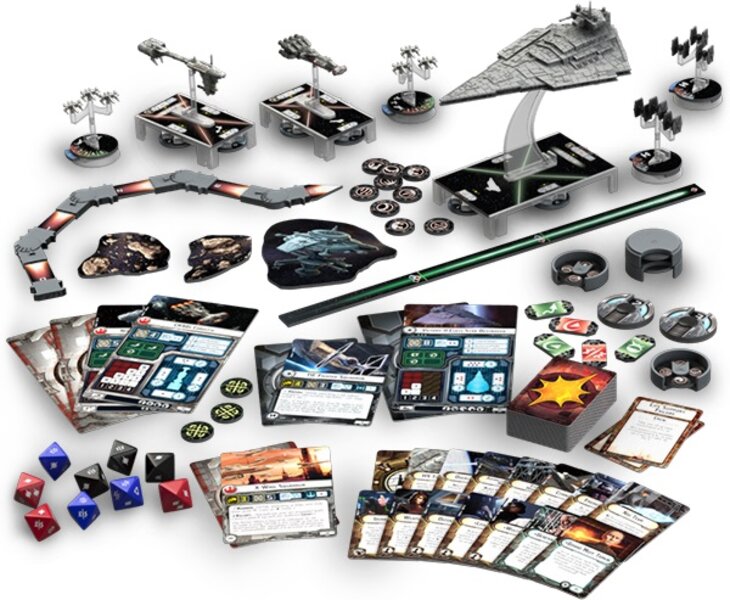 The Armada Core Set contains ten unpainted squadrons, three pre-painted capital ships, nearly one hundred cards, an innovative maneuver tool, a range ruler, six command dials, nine custom attack dice, and all the tokens that you need to engage the enemy and battle for the fate of the galaxy!
Space Battles on a Galactic Scale
The Armada Core Set contains ten unpainted squadrons, three pre-painted capital ships, nearly one hundred cards, an innovative maneuver tool, a range ruler, six command dials, nine custom attack dice, and all the tokens that you need to engage the enemy and battle for the fate of the galaxy!
Space Battles on a Galactic Scale
Winning a battle between capital starships requires more than raw firepower. It requires the coordinated activity of hundreds – even thousands – of crew. As a ship’s commanders belt out orders, gunners rain fire upon enemy ships, and engineering teams race to keep their ship’s shields and hull intact, often rerouting power where it’s needed most.
Armada allows you to bring one or more of these massive ships to battle, along with whole squadrons of starfighters. To win, you must issue commands, direct your fleet’s movement, coordinate its fire, sustain its defenses, and do all of this while remaining mindful of your battle objective.
More than that, you’ll need to master every aspect of the ships in your fleet. You need to become intimately familiar with your ship’s design, its firing arcs, its attacks and defenses, and the way that it uses the game’s unique maneuver tool to set its course.

The game’s unique maneuver tool.
This maneuver tool is one of the game’s most innovative features and adds a unique feel to the way your capital ships must accommodate for inertia as they maneuver through the stars.
 Using the game’s unique maneuver tool, a Rebel player plots a “3” speed maneuver for his Nebulon-B escort frigate
Using the game’s unique maneuver tool, a Rebel player plots a “3” speed maneuver for his Nebulon-B escort frigate
Capital ships can’t easily vary their speeds or execute hairpin turns like the starfighters that buzz around them. Accordingly, you only use the maneuver tool to maneuver your capital ships. Then, even as it makes it easy for you to set a ship’s course, the game’s maneuver tool lends an element of realism to its pitch and yaw.
As an example of how
Armada uses its maneuver tool to realistically portray the different ways its capital ships can maneuver, we can consider the differences between the CR90 and the Victory-class Star Destroyer.
 The speed chart for the CR90 (left) alongside that of the Victory-class Star Destroyer (right).
The speed chart for the CR90 (left) alongside that of the Victory-class Star Destroyer (right).
The CR90 is both capable of tighter turns and faster, with a maximum speed of "4" versus the Star Destroyer's maximum speed of "2." At speed "2," while the Star Destroyer can adjust the maneuver tool only one click at the second joint, the CR90 can adjust its course one click at the first join and two clicks at the second. Still, the faster the CR90 flies, the fewer clicks it can adjust its course through the initial range increments.
Another important consideration is that capital ships in
Star Wars: Armada fire before they move, so when you set your ship’s course, you’re always trying to set yourself up for a good shot in the next round. However, the more powerful your ship, the less nimble it is, and the harder it is to adjust your actions on the fly.
Altogether, the maneuver tool and the rules for ship movement work in tandem to force you to always look ahead. Successful fleet admirals excel at planning their attack strategies well in advance of their initial engagements.
Capital Ships in Combat
Armada balances the awesome scale of the
Star Wars galaxy’s ships and space warfare with intuitive ship designs and accessible rules for issuing commands and resolving combat that make for rich, engaging, and highly tactical play experiences.
Capital ships are extremely powerful war machines, but they’re also massive and sophisticated vessels that can’t swiftly react to every development in the heat of battle. Accordingly, the key to flying these vessels effectively is learning how to plan ahead. You want to issue your commands in such a way that your crews will be ready to execute them at just the right times.
Each of your pre-painted capital ships has a command value, which determines how many commands it will have in its stack at any given point in time. During setup, you secretly build your initial command stack, selecting from any of four different commands, each of which provides a different advantage. Once you have locked your selections, you place the commands in your stack in the order of your choice. Then, during each round of game play, you secretly select and assign a new command to your ship, placing it at the bottom of your command stack, before you reveal the command at the top of your stack and gain its benefits.
Choosing Commands
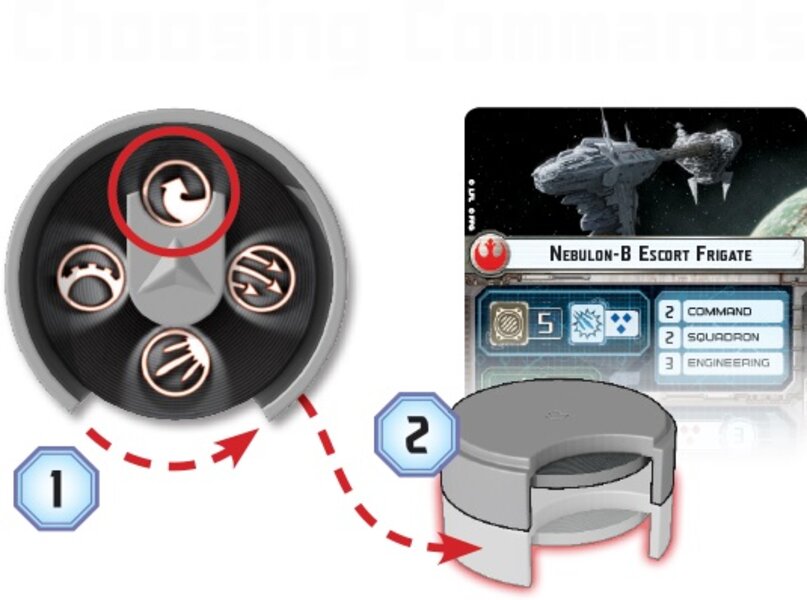 A Rebel player selects a command for his Nebulon-B escort frigate by framing it within his command dial’s fastener (1). Then, he places it at the bottom of his command stack, to be revealed in a future round (2).
A Rebel player selects a command for his Nebulon-B escort frigate by framing it within his command dial’s fastener (1). Then, he places it at the bottom of his command stack, to be revealed in a future round (2).
You might launch a screen of TIEs to intercept incoming X-wings. You might concentrate your fire on an incoming capital ship. You might scramble to repair your shields. Or if you reveal a command that doesn’t offer an immediate benefit, you can place a token on your ship and save a lesser version of that command’s benefits for later use.
Notably, the larger and more powerful your ship, the less quickly it can react to your commands. Most of the more powerful ships, like the Victory-class Star Destroyer, feature higher command values that force you to plan your actions two or more rounds ahead of time. In this way, the command stack doesn't just reflect the various actions your ships can take; it also reflects how swiftly they can adjust to the changing tides of battle.
After your ship resolves its command, it can perform up to two attacks. These can be directed against the same target or against different targets. However, these attacks must originate from two different hull sections and can only target ships or squadrons within range of those hull sections’ firing arcs.
 Ships are all divided into four sections, each of which has its own firing arc, shield rating, and attack value. Here, we see a Victory-class Star Destroyer presented next to its base.
Ships are all divided into four sections, each of which has its own firing arc, shield rating, and attack value. Here, we see a Victory-class Star Destroyer presented next to its base.
The number and type of dice you roll for your attacks depend upon the ship, the hull section from which its attack originates, and the range of the attack.
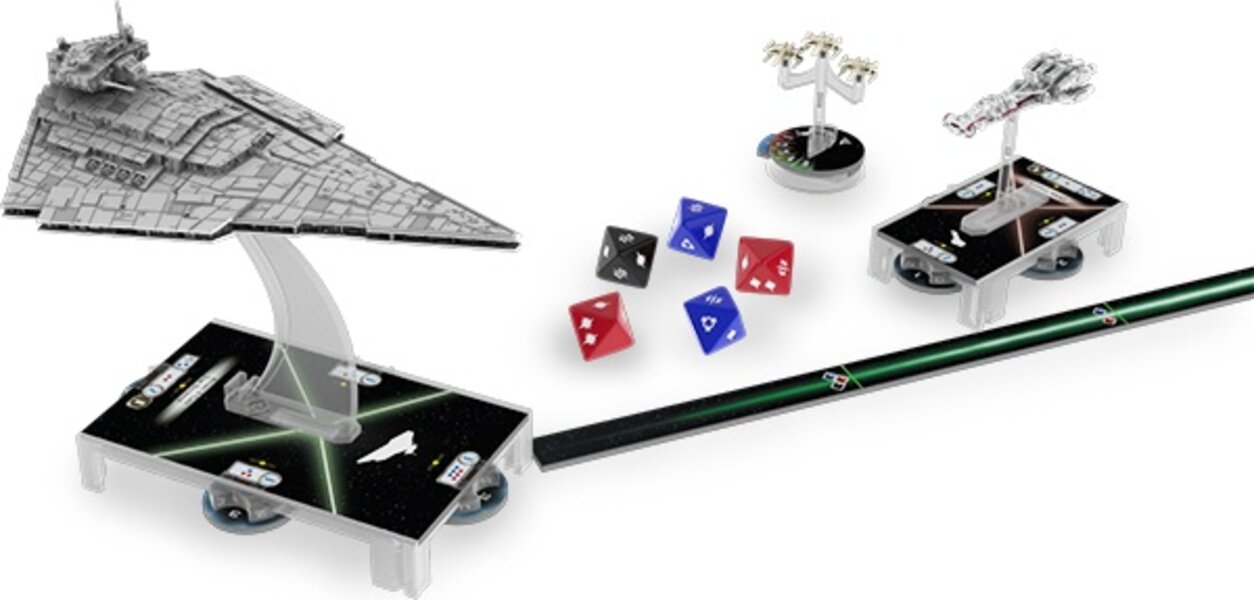 Each of the game’s attack dice presents a different effective range and spread of possible results
Each of the game’s attack dice presents a different effective range and spread of possible results
Meanwhile, each ship offers a number of defenses from enemy fire. Each ship’s hull is reinforced to withstand enemy fire, though larger ships like the Victory-class Star Destroyer can withstand much more than smaller ships like the Corellian corvette. Meanwhile, each section of your ship’s hull has a shield rating, indicating how many hits its shields can absorb before enemy fire damages the hull directly. Moreover, in the heat of battle, you need to decide when and how to make use of your ship’s defense tokens. With these, you can angle your deflector shields and perform evasive maneuvers to reduce the amount of damage your ship suffers.
Squadrons of Starfighters
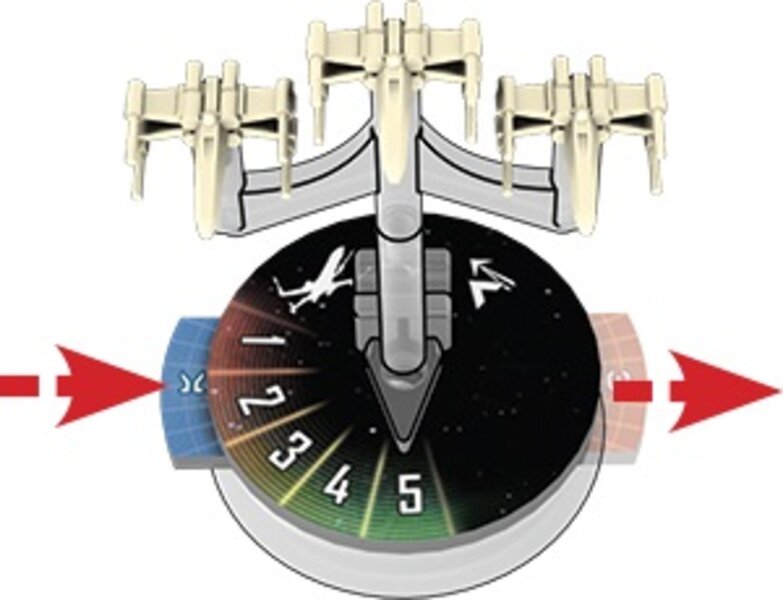 An X-wing squadron is shown connected to its base which tracks its remaining hit points (shown here at "5") and whether or not it has activated. Here, the blue tab on the left of the base indicates that the squadron has not yet activated. Once the squadron has activated, the tab is pushed through to the other side and displays its orange end.
An X-wing squadron is shown connected to its base which tracks its remaining hit points (shown here at "5") and whether or not it has activated. Here, the blue tab on the left of the base indicates that the squadron has not yet activated. Once the squadron has activated, the tab is pushed through to the other side and displays its orange end.
Although
Star Wars: Armada is built around the galaxy’s many capital ships, you’ll almost certainly want to fly one or more squadrons of starfighters in your fleet, both to threaten enemy ships and to defend your ships from enemy squadrons.
Your squadrons are highly adaptable and flexible collections of starfighters, and only a foolish fleet admiral would overlook the tactical options that they can bring to a battle. While squadrons don’t pack the raw power or resilience of the capital ships they accompany, they come with their own rules for movement and combat that make them far more capable of occupying and threatening the exact portion of the battlefield that you choose.
If left unchecked, a swarm of starfighters can tear down even the most massive of capital ships, and while capital ships can return their fire, any shot directed at squadrons is a shot not taken at a larger ship. Furthermore, capital ships don’t use their primary weapons while attacking squadrons; they have to use their anti-squadron armament, which is typically much less effective.
Add to this the fact that some squadrons are led by such skilled pilots as Luke Skywalker, who can bypass a capital ship’s shields when he attacks, and you’ll find that squadrons are far more than an afterthought. They’re powerful weapons that skilled fleet admirals will be able to integrate into their larger strategies.
Meanwhile, even though the squadrons in
Armada aren't pre-painted like the capital ships, they are presented in colors intended to complement their fleets.
Winning the Battle to Win the War
In addition to its ships and squadrons,
Armada shapes your
Star Wars battles with twelve different objective cards. Each game uses one of these objectives, which introduces special rules and helps to define the narrative of your battle. Are you tracking down a specific target? Are you contesting a key outpost? Are you trying to intercept key intel?
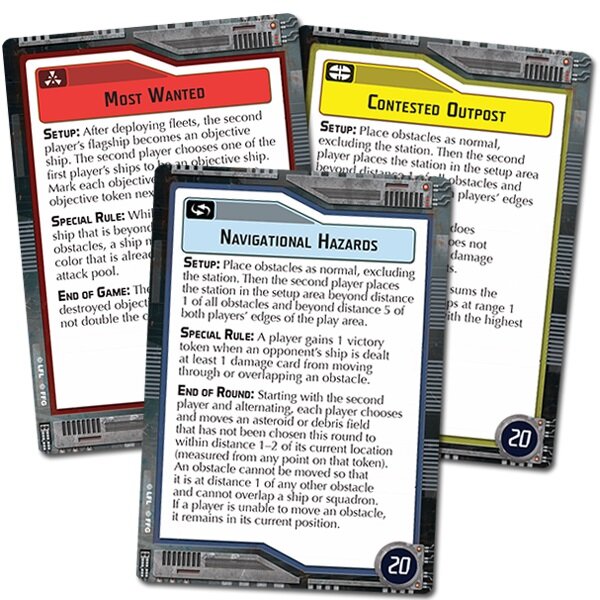 Objective cards challenge you to adapt your tactics in each battle
Objective cards challenge you to adapt your tactics in each battle
Importantly, the game’s objectives change the ways that you’ll score points in each battle, and they force you and your opponent to adapt your strategies, leading to tremendous replayability.
The Enemy Fleet Is Coming into Firing Range
Star Wars: Armada is due to arrive at retailers in early 2015, and Rebel and Imperial fleets will then battle for the fate of the galaxy!
 An Imperial fleet heads to battle, led by a pre-painted Victory-class Star Destroyer
An Imperial fleet heads to battle, led by a pre-painted Victory-class Star Destroyer
In the meantime, you can visit the game’s
description page to find more information and keep your eyes open for our upcoming series of previews, announcements of future expansions, and other news. Plus, if you’re headed to Gen Con Indy, you can stop by our booth for a free demo of its epic fleet battles!
Star Wars: Armada is an epic two-player game of tactical fleet battles in the Star Wars universe. Massive Star Destroyers fly to battle against Rebel corvettes and frigates. Banks of turbolasers unleash torrential volleys of fire against squadrons of X-wing and TIEs. As Rebel and Imperial fleets collide, it is your job to issue the commands that will decide the course of battle and, ultimately, the fate of the galaxy.© and ™ Lucasfilm Ltd.
(Source:
Fantasy Flight Games)










